Access free Indiana divorce records on anyone seamlessly.
Sometimes, looking up divorce records is necessary, and you need an official copy to prove your marital status for some legal or business reason (e.g., insurance claim, name change etc.). Alternatively, you may seek these records as part of a genealogy search to better understand your family roots.
Even if you want to look up divorce records out of curiosity about someone you know, you have the right to do so, thanks to the Indiana Access to Public Records Act; this law requires government agencies to provide citizens with public records, including divorce documents.
Below, you’ll uncover helpful information on how to access these records, what you can view and more.
Are Divorce Records Available to the Public in Indiana?
In Indiana, divorce records are generally considered public information and can be accessed by any citizen.
Indiana’s Access to Public Records Act mandates that the public has access to any documents and materials filed by either party or ordered by the Judge.1 In connection with a divorce, this may include case summary information, pleadings, and any court orders.
While some information is typically redacted in a divorce case (e.g., information about minors), Indiana law also allows divorce cases to be sealed in certain limited situations. If a record is sealed, then the public will not have access to that divorce information. If possible, the court will be as least restrictive as possible and only seal access to part of the divorce record.
To have a divorce record sealed, a party would have to prove that it either would (1) benefit the public interest, (2) create a significant chance of harm if not sealed, or (3) is essential to ensure that there is no prejudice in an ongoing case.
While divorce records are generally public information, it does not mean that the general public can request all relevant information. Requests for a certified copy of a divorce record or a divorce decree are limited to the parties to the matter and their attorneys.
While the state provides marriage and other vital records data, to get the most recently submitted state-level divorce rates, you will have to access the information provided by the census.2 The current divorce rate in Indiana is 8.4 per 1,000 people. This is higher than the national average divorce rate, which is 6.9 per 1,000 people.
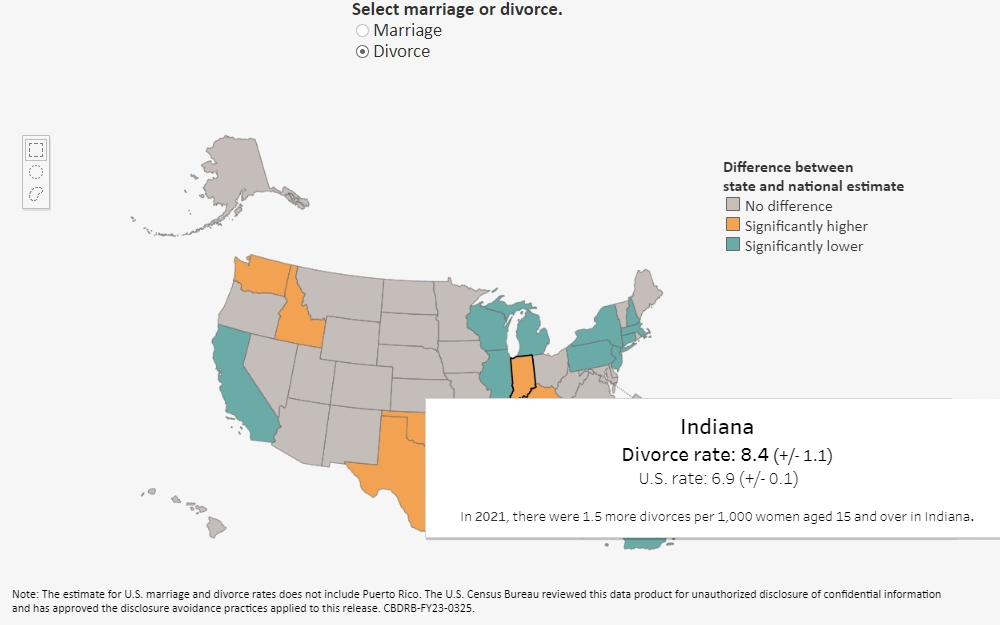
Usually, you can also find divorce rates with the Center for Disease Control and Prevention’s National Center for Health Statistics. However, while they currently provide all other Indiana vital records data, the most recent divorce rate has not been provided.
How To Find Indiana Divorce Records for Free
To obtain Indiana public divorce records, a citizen can use Indiana’s Unified Case Search Tool.
An individual can use this search tool to find divorce records by case number, name or attorney. Regardless of what type of search you perform, make sure you only check “Family,” where it asks you if you want to limit your request to certain types of cases.
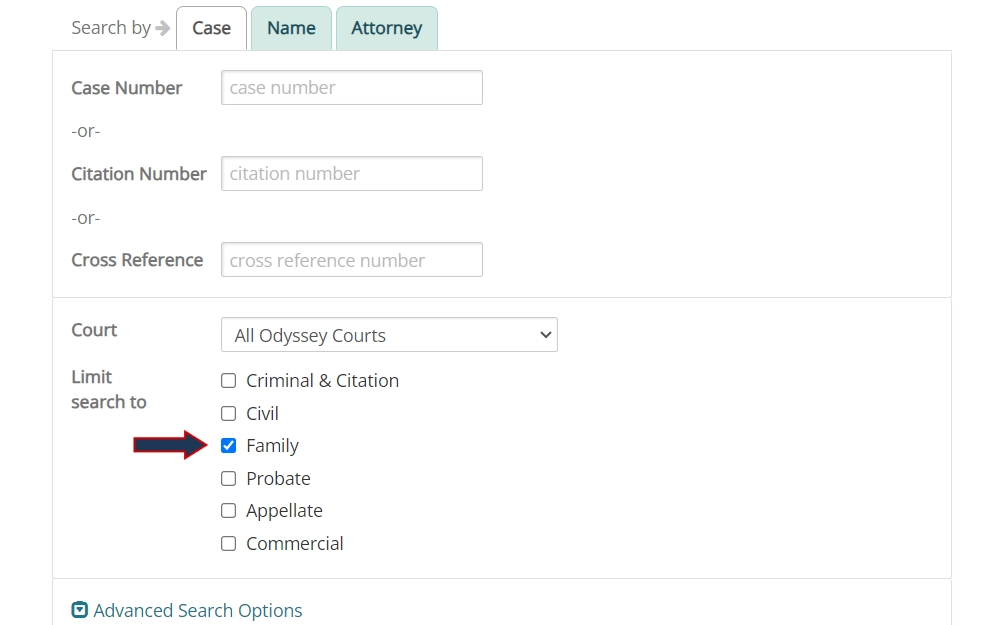
Next, you will want to enter either the case number or name. If you are doing a name search, you also have the option to enter a subject’s date of birth.
You can also narrow down your divorce record search by selecting a county if you know where the divorce occurred. Lastly, you can limit your search to open or closed cases and set a filing date range.
The search results will provide you with a summary of the case number, court, file date and status. You can also see the names of the parties and attorneys involved in the case. To view additional information, click on the case caption.
Here, you can access the following additional divorce information:
Parties to the Case: This section will provide you with the name and address of each party to the case.
Chronological Case Summary: This section provides you with a detailed and orderly accounting of every filing, hearing or event that happened in a particular case. Here, you can see how a case proceeded from the initial Petition for Dissolution to when the decree was issued.
Financial Information: Here, you can see details on court costs and filing fees and whether there are any payments due.
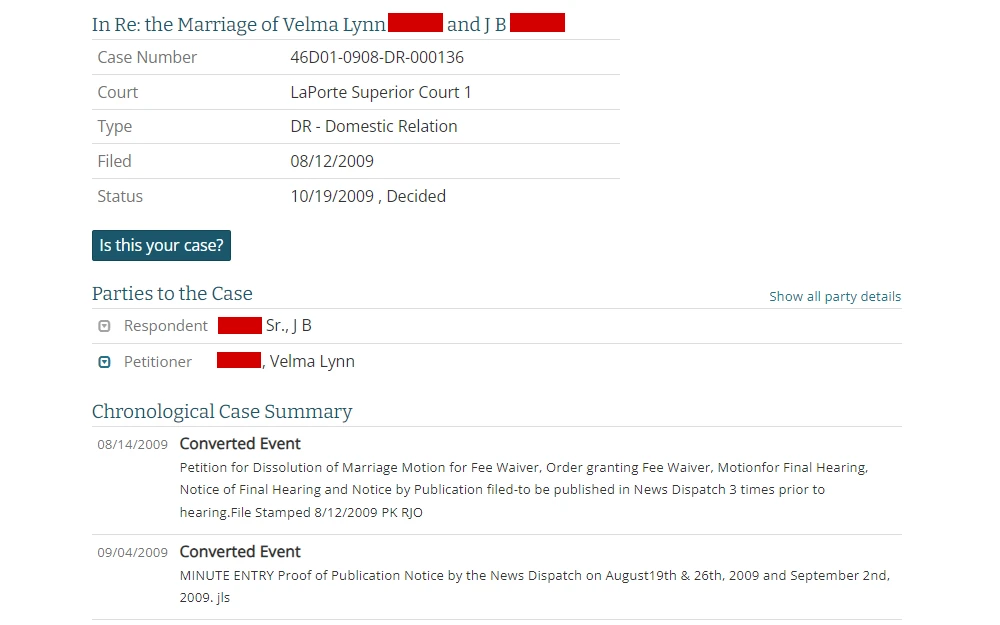
While the Indiana Unified Court search tool provides divorce records, a person may have a need for a divorce certificate or the actual decree.
A certificate is simply a way to provide official proof regarding the status and details of a divorce. The decree is the official order of divorce and contains additional data that is generally not available to the public.
There is no state-level option for requesting either a certificate or a decree. To request either of these documents, you will have to do so with the Clerk of Court in the county where the dissolution occurred. You will also have to go this route if you want to look further into specific divorce records where the online record is incomplete.
The information in this section is focused on accessing more recent divorce records. There are also other options for accessing archived divorce records and divorce indexes that will be discussed later in this article.
Obtaining Divorce Records via Counties & Cities in Indiana
While searching for divorce records at the state level allows you to perform a broad search, it is not your only option in Indiana. An individual also has the option to perform a free public divorce records search at the county level.
Depending on the county, access to divorce records may be easier. Or, you may have specific questions and want the option to talk to someone in person about searching these records.
Below is information on how to access divorce records in the three largest counties in the state. For other counties, you can Google search the county name and “divorce records” to see what options there are for accessing divorce records at that particular county.
The largest county in Indiana, and home to its largest city (Indianapolis), is Marion County. To obtain records of dissolved marriages in Marion County, you will have to make a request with the custodian of these records, the County Clerk’s Office.5 One option is to submit an online records request.
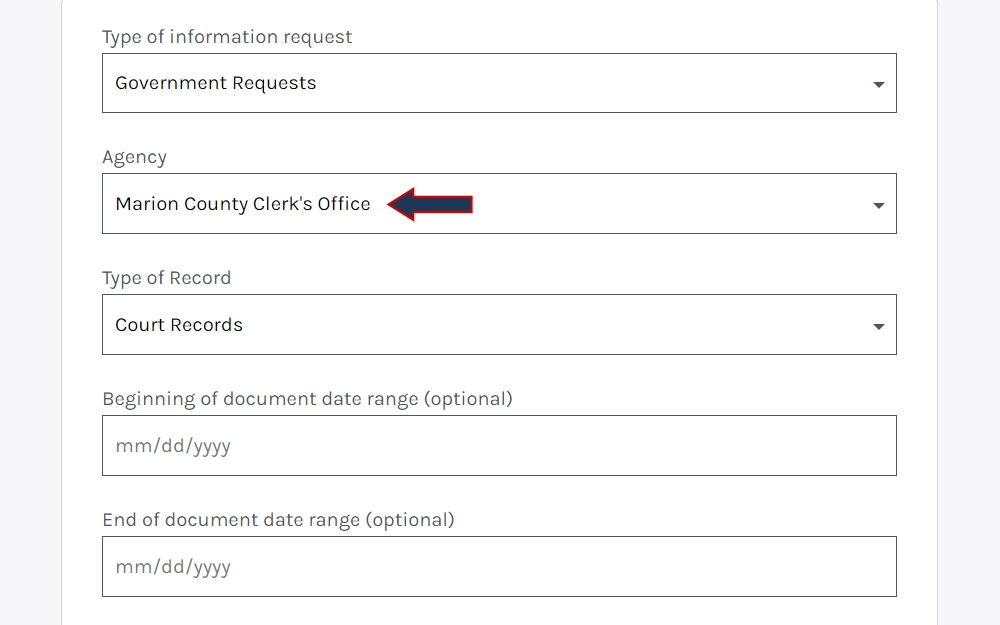
To make a request, make sure you provide as much specific information as possible to assist in locating the divorce record.
You can also make a request in person or by mail. The Clerk’s Office can be reached at any of the addresses listed below:
Community Justice Campus
675 Justice Way
Indianapolis, Indiana 46203
Indianapolis City-County Building
200 East Washington, W122
Indianapolis, Indiana 46203
Records Facility
1330 Madison Ave.
Indianapolis, Indiana 46225
To find the option that works best for you, try calling them first by phone at 317-327-4740 to ask them how a citizen can search or request divorce records. You may also want to contact the Marion County Superior Court’s Family Division at 317-327-4747 if you have any unanswered questions after talking to the Clerk’s Office.
Lake County is the second largest county by population in Indiana. If you want to access divorce records in Lake County, a great starting point is to talk to someone at the Clerk of Court’s Office. They are located at the address below:
Lake County Clerk of Court
2293 North Main St.
Crown Point, Indiana 46307
You can also submit a Request for Public Records to the above address.7 If you want to talk to someone by phone, you can call the Clerk’s Office at 219-755-3461.
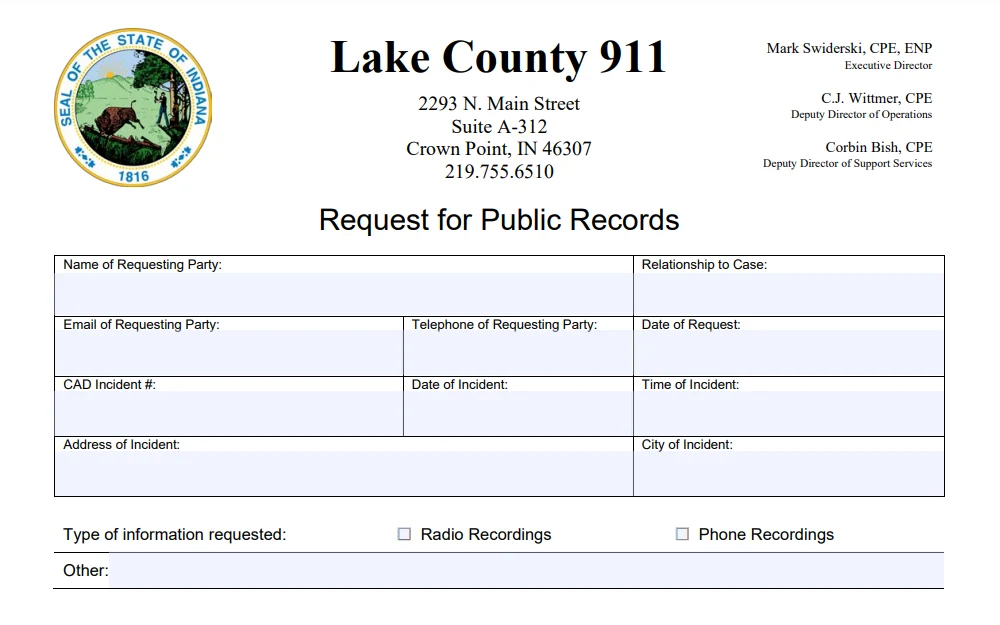
The third most populous county in Indiana is Allen County. If you are looking for divorce records in Allen County, you can make a request with the Clerk of the Allen Circuit & Superior Courts.8 You can call them at 260-449-7245 to ask them how to make a request, or you can go in person to the address below:
Allen County Clerk of Court
715 S. Calhoun St., Rm. 201
Fort Wayne, Indiana 46802
You can also contact the Family Relations Division of the Superior Court in Allen County by phone at 260-449-4121.9
Citizens can utilize the Tippecanoe County divorce lookup instructions to find details of dissolved marriages within the county’s jurisdiction.
Note: For each of these counties and throughout Indiana, you can conduct a county-specific divorce records search using the state’s online case search tool. Information on how to use this search tool was provided earlier in the article.
Reviewing Divorce Archives in Indiana for Genealogy & Lineage Research at No Cost
If you are performing a genealogy search, then you will likely need access to archived divorce records to get a complete picture of your family roots. To search archived divorce records, you can do so with the Indiana Archives & Records Administration Vital Records Department.10
A record seeker can use the Indiana Archives Record Series & Collections Search tool to look for digitized divorce documents.11 You can tailor your search in many ways depending on what divorce records you are looking for. Here are some of your search options when looking for archived divorce records:
- Record begin or end date (by decade) starting from 1760
- Access classification (e.g., restricted, public, partially confidential)
- Name of entity type
- Geographic location
- Record series
If you would like to search for these records in person or if you have questions, you can call the Indiana State Archives by phone at 317-591-5222.
You can also call the Indiana Archives & Records Administration Central Office at 317-232-3380. Call them to ask them how records are searched and at what locations in-person searches are available.
Below are their addresses to talk to someone in person and potential searches:
Indiana Archives & Records Administration
402 West Washington St, Rm. W472
Indianapolis, Indiana 46204
Indiana State Archives
6440 E. 30th St.
Indianapolis, Indiana 46219
Indiana State Records Center
6400 East 30th St.
Indianapolis, Indiana 46219
You can also send an email to [email protected] for any historical or genealogical requests from the Indiana Archives Collection.
In Indiana, archived records can also be searched directly with the Clerk of courts in the various counties in Indiana. They are responsible for maintaining divorce records from 1852 to the present.
If you know where a divorce record was filed, you can find the Clerk’s contact information using their Directory of Courts & Clerks in Indiana.12
The Clerk will be able to provide information on how to view or request these records and any related fees.
Lastly, you can check for archived divorce records through the state library’s Legacy Search Tool.13 This tool allows you to search archived records by type, which will allow you to exclude all other types of records besides divorces. Once you perform your search, you will get a list of indexes and the number of results in each.
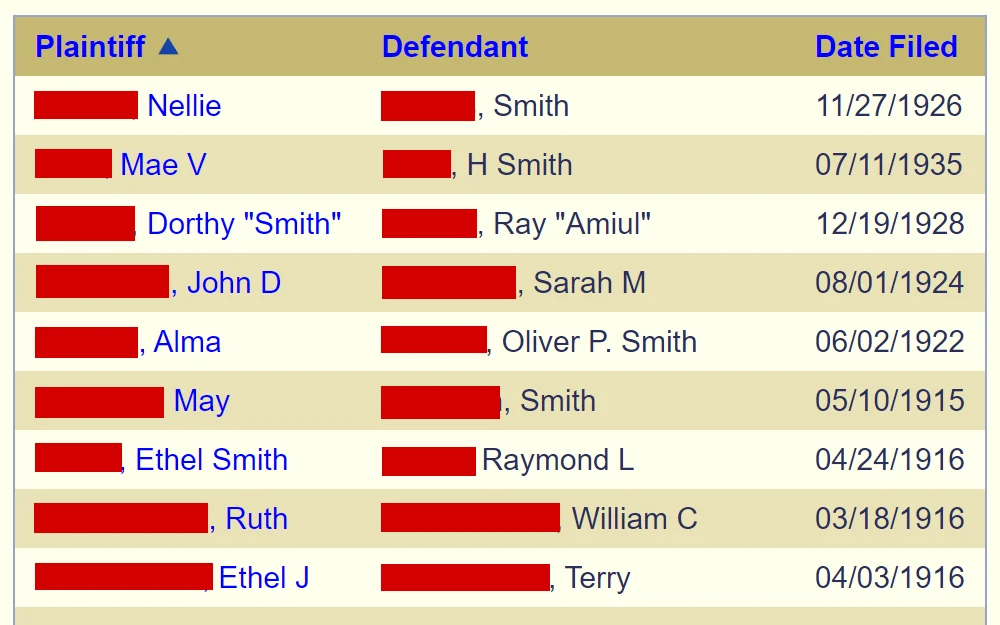
From there, you can click on the particular index to view more information.
There are other options when it comes to searching archived divorce records, and sometimes, you need to be creative and persistent. This might include checking in old newspapers, public libraries, historical societies and churches.
How To Retrieve Indiana Dissolution of Marriage & Common Law Divorce Records
If you want to retrieve information on a dissolution of marriage in Indiana, you can use the Indiana Courts Case Search Tool. In Indiana, a dissolution is the same as a divorce. This tool can be used to perform a case search to access online divorce records.
For additional information, you will have to contact the Clerk of court in the county where the divorce was finalized.
In Indiana, state law holds that any common law marriage entered into after January 1, 1958 is not valid.14 Also, there is no such thing as a common law divorce. Even for common law marriages that were entered into prior to 1958, individuals would have to go through the traditional divorce process.
For divorces involving common law marriages, you can find these records through the same processes outlined in this article for all other dissolutions.
In Indiana, there are no current statutes that allow for civil unions or domestic partnerships. While these types of relationships are not provided by Indiana statute, same-sex marriage has been legalized since October 6, 2014. Divorces of same-sex marriages can be found at the Clerk of court in the county where it was issued or by using the Indiana case search tool.
Navigating the Divorce Process in Indiana: Filing & Responding to Petitions
Divorce is a major life change for anyone. Over time, people and circumstances change from the time of their nuptials. If you have come to the point where you are considering ending your marriage or were served a divorce petition, you likely have many questions.
Divorces are driven by state law, and each state has its own unique requirements and processes.
Indiana allows for both fault and no-fault divorces. That means you can get divorced in Indiana as long as it’s determined that the marriage is irretrievably broken.
To file in Indiana, though, you need to make sure you meet the Indiana residency requirements. There is both a state and county requirement. One of the two parties to the divorce must be a resident of Indiana for at least six months and at least three months in the specific county where you are filing.
To get divorced in Indiana, you have to start by filing a Petition for Dissolution of Marriage.15 There are various items you will want to address in this Petition, depending on whether you and your spouse have children or not.
There are also different processes depending on whether there are disagreements between the parties, or you both are requesting an uncontested divorce. A divorce is uncontested only when both parties agree to all terms. This includes items such as property division, alimony, child support and custody.
In addition to filing the Petition with the court, a person must serve their spouse as well as submit a domestic relations appearance form.
If you have been served divorce papers in Indiana by your future ex-husband or ex-wife, you may have known it was coming or have been completely blindsided. Either way, it can be overwhelming to know what next steps you should take.
When you receive a divorce petition, the ultimate goal is to come to an amicable resolution. If that is not possible, you will want to consider providing a response to the Petition.
While it’s not required, you may want to submit a counter-petition for a couple of reasons. First, it keeps the divorce process moving forward in case your spouse changes their mind, but you still want it to proceed. Secondly, it gives you the opportunity to state to the court what you are looking for from the divorce.
Depending on the complexity of the divorce and how well you get along with your spouse, you may need to consider things such as mediation or a divorce appraisal. You will also want to consider hiring an attorney. They can answer your specific questions and help walk you through any difficult and stressful aspects of the divorce process.
Upon reading this article, you have learned about Indiana law on divorce records, how to access them and the type of information you can view. Use the information provided here to assist you in your search for Indiana divorce records, or turn to the IN free public information lookup tutorial for guidance on finding other record types (warrants, marriages, property, court cases, and more).
References
1Kossack, A. J. (2009, September 25). Indiana’s Access to Public Records Act. IN.gov. Retrieved November 9, 2023, from <https://www.in.gov/pac/files/Presentation_of_Indiana_Geneological_Society.pdf>
2United States Census Bureau. (2023, May 31). U.S. Marriage and Divorce Rates by State: 2011 & 2021. Retrieved November 9, 2023, from <https://www.census.gov/library/visualizations/interactive/marriage-divorce-rates-by-state-2011-2021.html>
3Indiana Courts, Office of Judicial Administration. (n.d.). Indiana Courts Case Search – MyCase. IN.gov. Retrieved November 9, 2023, from <https://public.courts.in.gov/mycase/#/vw/Search>
4Indiana Courts Public Records. (n.d.). Indiana Courts Case Summary – MyCase. IN.gov. Retrieved November 9, 2023, from <https://public.courts.in.gov/mycase/#/vw/CaseSummary/eyJ2Ijp7IkNhc2VUb2tlbiI6IlE4WG9Wd2o4NmY0cXFPc0gwT3pjSnVlUUttcm9Ca3VPVHNmbWx4YzRwWFkxIn19>
5Indianapolis & Marion County. (n.d.). indy.gov: Marion County Clerk’s Office. Indy.gov. Retrieved November 9, 2023, from <https://www.indy.gov/agency/marion-county-clerks-office>
6Indianapolis & Marion County. (n.d.). Public Record Request. Indy.gov. Retrieved November 9, 2023, from <http://indy.gov/workflow/public-record-request>
7Lake County, Indiana. (n.d.). Public Records Request. Retrieved November 9, 2023, from <https://lakecounty.in.gov/departments/lc911/public-records-request>
8Allen Co. Clerk of the Court. (n.d.). Contact Us. Retrieved November 9, 2023, from <https://j7v.f59.myftpupload.com/contact-us/>
9Allen Superior Court. (n.d.). Petition for Dissolution of Marriage. Retrieved November 9, 2023, from <https://allensuperiorcourt.us/family-relations/dissolution-of-marriage/>
10Indiana Archives and Records Administration. (n.d.). IARA: Vital Records. IN.gov. Retrieved November 9, 2023, from <https://www.in.gov/iara/divisions/state-archives/collections/vital-records/>
11Indiana Archives and Records Administration. (n.d.). Record Series and Collections. IN.gov. Retrieved November 9, 2023, from <http://in.gov/iara/services-for-public/search-archives-holdings/record-series-and-collections/>
12Indiana Judicial Branch. (n.d.). Directory of Courts & Clerks in Indiana. IN.gov. Retrieved November 9, 2023, from <http://in.gov/courts/files/court-directory.pdf>
13Indiana State Library. (n.d.). Indiana Legacy. IN.gov. Retrieved November 9, 2023, from <https://digital.statelib.lib.in.us/legacy/>
14Indiana Statehouse. (n.d.). IGA | 2018 Indiana Code. IN.gov. Retrieved November 9, 2023, from <http://iga.in.gov/laws/2018/ic/titles/31#31-11-8-5>
15Indiana Legal Help. (n.d.). Divorce. Retrieved November 9, 2023, from <http://indianalegalhelp.org/legal-topic-category/divorce-2/>
